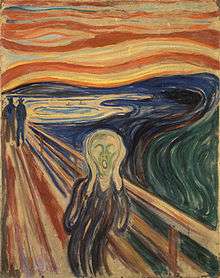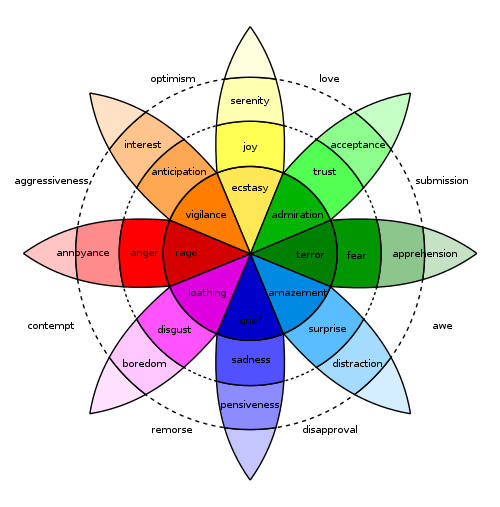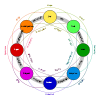Angst
Angst means fear or anxiety (anguish is its Latinate equivalent, and anxious, anxiety are of similar origin). The dictionary definition for angst is a feeling of anxiety, apprehension, or insecurity.[1]

Etymology
The word angst was introduced into English from the Danish, Norwegian, and Dutch word angst and the German word Angst. It is attested since the 19th century in English translations of the works of Kierkegaard and Freud.[1][2][3] It is used in English to describe an intense feeling of apprehension, anxiety, or inner turmoil.
In other languages, having the meaning of the Latin word pavor for "fear", the derived words differ in meaning; for example, as in the French anxiété and peur. The word angst has existed since the 8th century, from the Proto-Indo-European root *anghu-, "restraint" from which Old High German angust developed.[4] It is pre-cognate with the Latin angustia, "tensity, tightness" and angor, "choking, clogging"; compare to the Ancient Greek ἄγχω (ánkhō) "strangle".
Existentialist angst
In Existentialist philosophy, the term angst carries a specific conceptual meaning. The use of the term was first attributed to Danish philosopher Søren Kierkegaard (1813–1855). In The Concept of Anxiety (also known as The Concept of Dread, depending on the translation), Kierkegaard used the word Angest (in common Danish, angst, meaning "dread" or "anxiety") to describe a profound and deep-seated condition. Where non-human animals are guided solely by instinct, said Kierkegaard, human beings enjoy a freedom of choice that we find both appealing and terrifying.[4][5] It is the anxiety of understanding of being free when considering undefined possibilities of one's life and one's power of choice over them.[5][6] Kierkegaard's concept of angst reappeared in the works of existentialist philosophers who followed, such as Friedrich Nietzsche, Jean-Paul Sartre, and Martin Heidegger, each of whom developed the idea further in individual ways. While Kierkegaard's angst referred mainly to ambiguous feelings about moral freedom within a religious personal belief system, later existentialists discussed conflicts of personal principles, cultural norms, and existential despair.
Music
Existential angst makes its appearance in classical musical composition in the early twentieth century as a result of both philosophical developments and as a reflection of the war-torn times. Notable composers whose works are often linked with the concept include Gustav Mahler, Richard Strauss (operas Elektra and Salome), Claude-Achille Debussy (opera Pelleas et Melisande, ballet Jeux, other works), Jean Sibelius (especially the Fourth Symphony), Arnold Schoenberg (A Survivor from Warsaw, other works), Alban Berg, Francis Poulenc (opera Dialogues of the Carmelites), Dmitri Shostakovich (opera Lady Macbeth of the Mtsensk District, symphonies and chamber music), Béla Bartók (opera Bluebeard's Castle, other works), and Krzysztof Penderecki (especially Threnody to the Victims of Hiroshima).
Angst began to be discussed in reference to popular music in the mid- to late 1950s amid widespread concerns over international tensions and nuclear proliferation. Jeff Nuttall's book Bomb Culture (1968) traced angst in popular culture to Hiroshima. Dread was expressed in works of folk rock such as Bob Dylan's Masters of War (1963) and A Hard Rain's a-Gonna Fall. The term often makes an appearance in reference to punk rock, grunge, nu metal, and works of emo where expressions of melancholy, existential despair, or nihilism predominate.
See also
- Anger – Intense hostile emotional state
- Byronic hero – Type of antihero often characterized by isolation and contemplation
- Emotion – Subjective, conscious experience characterised primarily by psychophysiological expressions, biological reactions, and mental states
- Existentialism – Philosophical study that begins with the acting, feeling, living human individual
- Kafkaesque
- Emotion classification#Lists of emotions – Contrast of one emotion from another
- Fear of death – Anxiety caused by thoughts of death
- Sehnsucht – German noun for an emotion of longing
- Alienation – Condition in social relationships
- Sturm und Drang – Proto-Romantic movement in German literature and music
- Terror management theory – Social and evolutionary psychology theory
- Weltschmerz – German word for deep sadness about the state of the world
References
- "Angst". Merriam-Webster. Retrieved December 12, 2018.
- "Angst". Dictionary.com.
- "Angst". Online Etymology Dictionary.
- "Angst". The Free Dictionary.
- Marino, Gordon (March 17, 2012). "The Danish Doctor of Dread". The New York Times. New York City. Retrieved May 18, 2013.
- Backhouse, Stephen (2016). Kierkegaard: A Single Life. HarperCollins Christian Publishing. ISBN 9780310520894. Retrieved July 17, 2017.
External links


